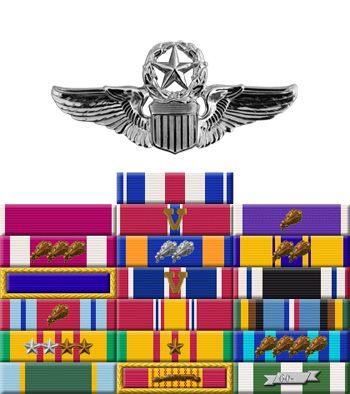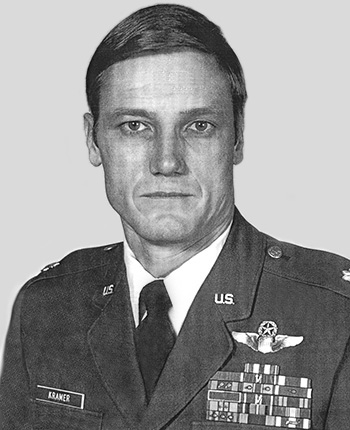
|
Galand D. Kramer |
 |
|||
| Rank, Service | ||||
Lieutenant Colonel O-5, U.S. Air Force |
||||
| Veteran of: | ||||
|
||||
| Tribute: | ||||
Galand Kramer was born in 1941 in Topeka, Kansas. He was commissioned a 2d Lt in the U.S. Air Force through the Air Force ROTC program on July 31, 1964, and went on active duty beginning October 4, 1964. Lt Kramer next completed Undergraduate Pilot Training and was awarded his pilot wings at Vance AFB, Oklahoma, in October 1965, followed by Pilot/Systems Operator Training and F-4 Phantom II Combat Crew Training from November 1965 to June 1966. His first assignment was as an F-4 pilot with the 390th Tactical Fighter Squadron at DaNang AB, South Vietnam, from July 1966 until he was forced to eject over North Vietnam and was taken as a Prisoner of War on January 19, 1967. After spending 2,217 days in captivity, Capt Kramer was released during Operation Homecoming on February 12, 1973. He was briefly hospitalized to recover from his injuries at Sheppard AFB, Texas, and then served as Special Advisor to the Commander of the 3636th Combat Crew Training Wing at Fairchild AFB, Washington, from January 1974 to January 1975. Maj Kramer next served as a project test pilot and on the staff of the 3246th Test Wing in the Armament Development and Test Center at Eglin AFB, Florida, from February 1975 to August 1977, followed by Air Command and Staff College at Maxwell AFB, Alabama, from August 1977 to July 1978. Col Kramer served as Chief of the Current Operations and Requirements Branch and then as Chief of the Current Operations Division with the 3636th Combat Crew Training Wing at Fairchild AFB from July 1978 to August 1981, and then as the T-37 Squadron Commander, 35th Flying Training Squadron of the 64th Flying Training Wing at Reese AFB, Texas, from August 1981 to July 1983. His final assignment was as a Section Commander and Wing Chief with the Squadron Officer School at Maxwell AFB from August 1983 until his retirement from the Air Force on November 1, 1984. |
||||
|
||||

